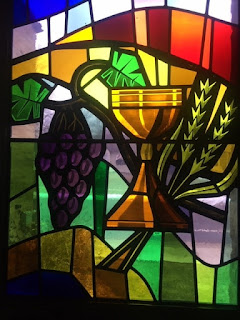Unwelcome Good News Luke 4:14-30
Not every prophet is welcomed—especially when they have to speak to the people who assume they know the prophet already. When Jesus went home—to Nazareth he met rage and the deepest hurt of the people.
Luke tells the story of his moment in Nazareth, his hometown up in the hills. He was maybe a days walk west of Lake Galilee. He went into the synagogue, just like he did every week. Luke says it was his custom. It was a religious act—a ritual that meant something to him and others in his generation in Nazareth. Jesus stood up and read from the scroll of the prophet Isaiah. These words from an ancient prophet proclaimed hope and the coming of God's anointing Spirit. Isaiah promised good news – good news for the poor, release for the captives and sight returning for the blind.
Jesus rolled up the scroll. He handed it back to the person who served as leader in the synagogue. And what he had to say next spoke to the people's deepest hopes and expectations.
σήμερον πεπλήρωται ἡ γραφὴ αὕτη ἐν τοι̂ς ὠσὶν ὑμω̂νImagine the smiles and the looks of satisfaction in the eyes of the hometown crowd as Jesus spoke. He was reading some to the sweetest words of a beloved old book. What he read it was like a healing balm for hurting souls. God knows we need to hear these words of hope.
at this hour these word are fulfilled in your hearing
Luke 4:21
The people had heard about miracles in other cities. And in that moment they waited wondering what Jesus could do in their town. He spoke directly to their expectation. And his words had bite,
λέγω ὑμι̂ν ὅτι οὐδεὶς προφήτης δεκτός ἐστιν ἐν τῃ̂ πατρίδι αὐτοQuickly he was naming miracles that came for foreigners and even the enemies of his people.
I say to you that no prophets is acceptable in their parents land/town
Luke 4:24
He spoke of help coming for a foreign woman and child while the people of Israel suffered The people knew the story. Elijah, a great man of God, came to this widow in Zarapheth and her to share food with him. She was planning to cook a last meal for her and her son. But the prophet convinced her—a foreigner—to help him. She took her last meal and last oil and cooked him a little cake. And her jug of oil and jar of meal never ran out. It was a miracle but a huge question was left—why would God help her and her son when the people of Israel knew suffering (1 Kings 17).
Now Jesus spoke of even more troublesome miracle. Naaman—the general of the neighboring super power Syria came looking for help and Elisha healed him. Sure there were others in Israel with skin diseases—but God's servant Elisha was the one who gave Naaman directions how he could healed (2 Kings 5).
Jesus named the truth: God had done great things for people beyond one nation. His words pushed his own hometown crowd too far. The truth of his words brought out deep seated anger And the enraged crowd pushed him to the edge of town. They were ready to push him of the brow of hill—and Jesus slipped through the crowd.
Preaching the Good News often means speaking of God's love that is greater than human love. Some will not want to hear that their is good news for all the worlds hurting. Some don't understand the breadth and depth of God's love. Some think God is like them because they are so limited by the sin of racism, classicism, anti-semitism, and all other kinds of hate and ism. To be like Jesus means boldly prolcaiming good news. Preaching the power of God means announcing hope not just for those I like or love—but for all the hurting of the world.
May we have courage to speak so boldly to the world,
Peace and thanks for reading, John.


